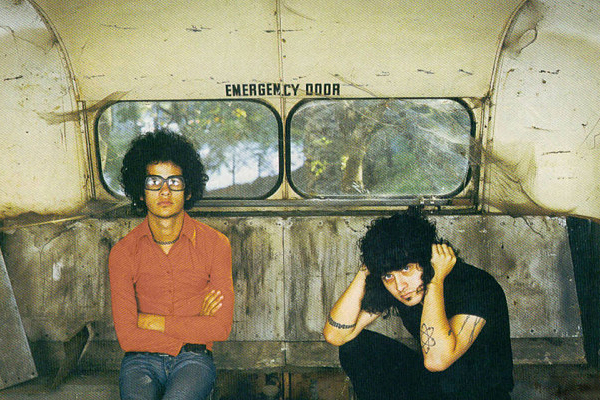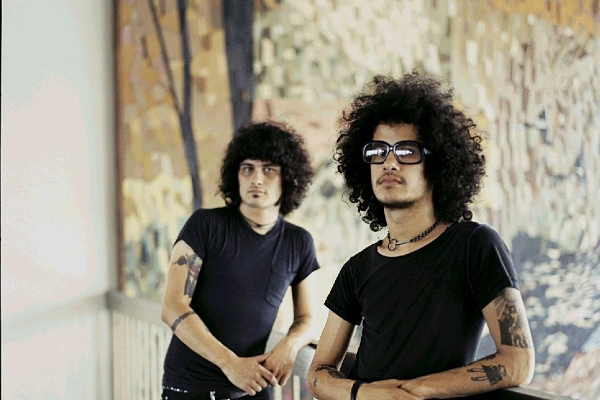
In the course of more than ten years, El Paso outfit THE MARS VOLTA have never stopped experimenting. Their grasp of psychedelia and complexity is unmatched, which is a fair thing to say given their last three records are as sonically thick as their first three, not to mention other projects/releases such as prestigious live recordings. With their latest disc, Noctourniquet, set to be unraveled this month, we caught up with guitarist Omar Rodriguez-Lopez to chat about the band’s persona, his upbringing and how the group’s future is still a bold-type question mark.
Your new album Nocturniquet is The Mars Volta’s fourth album since the 2005 live disc Scabdates – is the live format something you think the group will revisit again in the future?
Yeah, sure. You know, as long as it doesn’t take up too much time, I don’t see why not.
More than that, this is the band’s sixth studio album – and since you became Grammy Award winners in 2009 – has it been suggested that maybe you should release a greatest hits album?
No, no. I don’t think anyone’s ever going to suggest that, seeing as we don’t have any hits. We have a Grammy and we’ve only had one song on the radio. That’s about the extent of our hit factory. I just don’t really think we’ve been a band who has had hits. We’ve just been a band that’s worked hard and amassed a grassroots following from the beginning. It grew way larger than any of our expectations or any of our desires. We’re good with that.
I’m a youngest child in my family with siblings older than me, so they were off at college before I got too old myself, and I didn’t get the chance to get too close to them until more recently. I read you had the opposite sort of experience as the older sibling to your brother Marcel. When he entered the band, was that the first time you really got to know each other?
Yeah, definitely. That definitely was the “us getting to know each other” by him playing in my group. I mean, we were separated by eight years and I left home at 16, so he was just a kid when I took off hitchhiking and stuff around the country, and eventually I went straight into touring so I didn’t see him much besides coming home and bringing records as presents or something. So, I definitely got to know him through playing music together.
Did you first start playing together during the recording of Frances The Mute?
No, he joined the band during the tour for De-Loused In The Comatorium. He played and toured with me for a good year before we got to the studio.
When you started touring with him, did that make the touring experience much different for you – having a member of your family along for the ride?
Oh, without a doubt. It was a whole different thing for me, a whole different ball game in certain aspects. In other aspects, you know, you’re on tour. You do what you’ve gotta do.
How would you say your relationship with him has grown since then?
Well, you know, it’s matured. I only knew him as a child, when he was my little baby brother. That part of knowing who he was stayed in my consciousness for a long time even throughout the years, so, we’ve had enough explosive situations and enough arguments to where it really started to become clear to me that I hadn’t let him evolve in my mind into what he is, into an individual and an adult that was my baby brother. And so, when you think in terms of that, it turns the whole thing around.
Now you’re not only playing and touring together a lot, your production company is also releasing albums made by the band he plays drums in, Zechs Marquise.
I just put out their records. He actually produces; he produced their second record Getting Paid. But then I take them out on tour and put out their records.
What are the ages of your other two brothers, Marfred and Rikardo, relative to yours?
I’m seven years older than Marfred and Rikardo… shit… I could practically be his dad.
Did they grow up playing together in bands?
Sort of. Definitely Marfred and Marcel because they’re only a year apart. Rikardo just grew up seeing everybody play and he had his own bands and stuff. Eventually those guys invited him to play in their band. He sort of grew up around everybody having their own band, so he started his own band and made his own recordings and stuff, and then eventually was brought into the fold.
Any chance the four of you might all work on something together in the future?
Oh sure, of course. We’re family.
Do you see your career moving more in the direction of production as you get older?
I see it going in any direction. I definitely don’t intend to be playing rock music on stage into my 40s and 50s, but there could be a different form I’m playing. The production aspect of it is fun, and then there’s all the film stuff. I just see myself being expressive through whatever means necessary that’s relative to where I am at that point in my life.

A lot of performers have a character or an onstage persona – would you say you have one yourself?
I don’t think that I… maybe I do. Shit, I don’t even know. When I’m onstage I get to live out things – desires and fantasies that I don’t necessarily live out in everyday life, in a way. But in another way, on stage, I guess it could be perceived that I don’t care… I don’t know. I don’t know what my onstage persona is, that’s a good question. I know there’s a certain freedom that happens when you’re going onstage because people don’t know you. They’re just seeing you from a distance so you can sort of plug in and let loose. That having been said, I also let loose in my waking life as well, but, it’s just in a completely different way with a different kind of sensibility to it.
Sort of as a follow up then, have you got a set wardrobe of clothes that you’ll only wear on stage that you wouldn’t wear as street clothes?
No, no, that’s my point. I’m just me. The me that’s in front of people, that’s the me that’s in front of people. The me that’s in the bedroom with the doors locked, that’s the me that’s in the bedroom with the doors locked. The me that’s in a room with three people, that’s the me that’s in a room with three people. When I was wearing three-piece suits on stage for five years, that’s because I wore three-piece suits every day for five years. I never wore anything casual. That’s just what I was doing at the time. I’m a person who gets five of the same types of suits and wears them over and over, or five of the same types of shirts and pants and wears them over and over so I don’t have to think about it.
Have you been rehearsing or playing much older material since Lars Stalfors (keyboards) and Deantoni Parks (drums) have become members of the group?
I don’t think we’ve been playing older songs. I’m trying to think… we’ve only been playing this new record really. We might have played one song off of Bedlam.
Have you stayed in touch with other frequent collaborators, such as John Frusciante?
Yeah, of course. He’s one of my closest friends.
You’ve definitely recorded some great material together on each other’s albums and other projects; is there any chance that might happen again?
Maybe in the future, but John’s in a different place right now. He’s in a place where he couldn’t care less about putting things out or about something being a product. He’s living by different standards right now with a different philosophy, so he doesn’t want to be a part of anything that he knows is going to end up being a product. A Mars Volta record definitely ends up being a product.
Well, when you’re as prolific in such a short amount of time I think you earn that right.
Right (laughs).
[Like this interview? Find more music news, interviews and videos on Twitter]
CHRIST!!!!! Frusciante’s new record is never coming out.